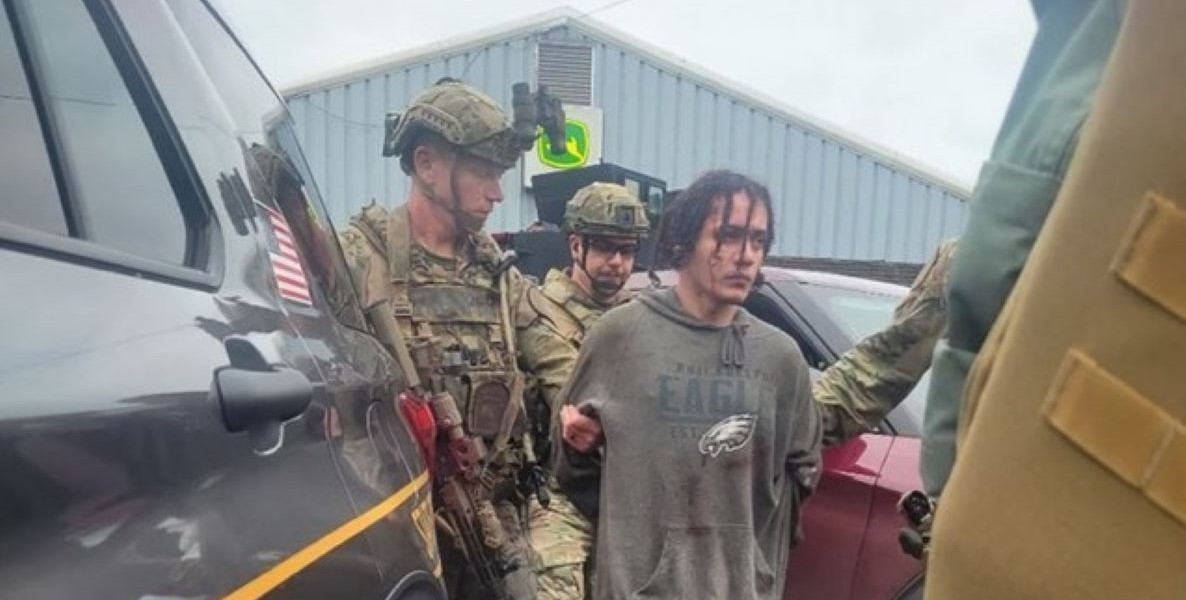During this week’s breathless, endless media coverage of the capture of escaped abuser and murderer Danilo Cavalcante, we observers could not get enough of the details. His walk up jailhouse walls. His outfit changes. The dairy van. Watermelon. The woodpile. A Walmart pitstop. Granola bars. Garages. Hidden poop. Ring cameras. Macho men in camo. Yoda the malinois. An Eagles hoodie.
Provided we don’t forget him entirely, we rapt watchers will likely remember the Brazilian convict for his ability to escape jail and evade authorities — not to mention to get into Longwood Gardens without paying $25. Cavalcante is certainly exceptional when it comes to jailbreaks and survival techniques.
The harder, less exciting truth got far less attention. Dude is all too common when it comes to his original crime.
The original crime of Danilo Cavalcante
In April 2021, following months of hurting and stalking and threatening his ex-girlfriend, Deborah Brandão, Cavalcante stabbed her to death in her home in the presence of her 4- and 7-year-old children. This August, he received a life sentence for the murder. His crime, in all its terribleness, simply makes him one of many.
This past August in Philly, too, Marcus Burney was convicted for using a ghost gun to kill 20-year-old Sahmya Garcia, his ex-girlfriend — two days after she took out an emergency protection-from-abuse order for him. Garcia was one of 60 Pennsylvania residents who died in 2022 at the hands of a current or former intimate partner, according to the PA Coalition Against Domestic Violence (PCADV). (The agency reports that all domestic violence, which includes parents and children, took the lives of 112 PA residents last year.)

PA’s domestic violence statistics, says Pamela Henshall, executive director of Women in Transition, are on par with the nation’s. The National Domestic Abuse Hotline reports that every minute in the U.S., approximately 20 people experience intimate partner abuse. Ninety-five percent of these victims are women; 95 percent of the abusers are men.
In 2021, according to the Bureau of Justice Statistics, 1,690 women were killed by a current or former intimate partner. The top risk factor and therefore predictor of intimate partner homicide? Previous domestic violence.
Prison breaks like Cavalcante’s are serious. But they are also rare. Abuse is not. And it will continue to be all too common until we, societally and individually, learn how to prevent domestic violence, and how to better handle it when it happens. The road to better, says Henshall, is long: “Everything needs attention.”
Here, some ways to start:
Call for help — for you or someone else.
Women in Transition’s warmline offers live help for victims and observers of abuse. Reach them Monday through Friday, from 10am to 4pm, at (215) 751-1111. Call back as many times as you need to.
Emergency? Call Philadelphia’s 24/7 domestic violence hotline: (866) 723-3014.
Be aware.
This summer, the PA Coalition Against Domestic Violence (PCADV) debuted their new logo at a Phillies home game. It was the first time the Phils partnered with the 51-year-old Philadelphia organization. “We wore t-shirts that said, ‘Every1KnowsSome1,’” says Henshall, who was there. “That message alone needs to be really understood.”
One in three women and one in four men have experienced domestic violence. Chances are, you don’t know someone: You know many someones. “We all need to be paying attention to each other. We need to be kind to each other,” Henshall says.
Know the signs.
According to DomesticShelters.org, signs of intimate partner abuse include:
-
- Jealousy of friends, or time away from a partner.
- Creating shame or embarrassment.
- Controlling financial decisions.
- Preventing you from working, spending time with friends or family.
- Damaging property.
- Threatening violence against you or someone you care for.
- Pressuring you into sex.
- Physical intimidation.
Believe women.
Women in Transition Program Director Irene Lindsay Brantley has worked there 26 years. She says, “Women in Transition has been around for 50 years and we have never wanted for clients.”
Her top advice: Believe women. “Even with close family members, there are people who are not believing survivors. Sometimes the police officers don’t believe them, the legal system doesn’t believe them,” says Lindsay Brantley. “It’s very important to be believed and to be validated. Let them know it’s not their fault, and that there are services out there.”
Support a victim.
Listen to the person experiencing abuse. Instead of judging, offer to help however you can. Let them guide you. Here are some ways you might ask to help:
-
- Research. Many victims fear retaliation for looking into ways to help themselves. Ask if you can help research hotlines, counseling, transitional housing, legal services.
- Document. Note every instance of abuse that you witness. Include location, date, time, injuries and details for each. Keep these notes safe. The police or an attorney may need them.
- Create a safety plan. Women in Transition calls safety planning an “ongoing process” of adjusting to changing circumstances. A safety plan might include creating a network of neighbors who know to call police if they hear suspicious noises, coming up with a safe word to use in an emergency, gathering and storing documents in an accessible but private location.
- Babysit. Some organizations ask for volunteers to watch children while survivors attend meetings.
- Be a refuge. Going through and recovering from domestic abuse is a marathon, not a sprint. You can help a survivor by doing the grocery shopping or making meals. Take a walk together. Just hang out.
Women in Transition offers more tips on supporting survivors here.
Come out and show support.
October is Domestic Violence Awareness Month.
Join Women Against Abuse on Wednesday, October 11 at noon in the City Hall Courtyard to take a public stand against domestic violence.
Women in Transition hosts an evening of poetry, story sharing, empathy and empowerment on Wednesday, October 18 from 7 to 8:30pm. Join them.
Thursday, October 19 is “Purple Thursday.” The PA Coalition Against Domestic Violence encourages everyone to wear purple and post a selfie with #PurpleThursday and #Every1KnowsSome1
Women Against Abuse offers ways to take immediate action to expand funding and access to services for survivors, including writing to local and state legislators.
Advocate for common sense gun laws.
Women are five times more likely to be killed if their abuser has access to a firearm. Last year in PA, two of three domestic violence homicides involved a gun — despite a law that prohibits people who’ve been convicted of abuse to possess a gun.
Democratic senators in the state legislature have again proposed a so-called “red flag” law that allows a judge to issue an Extreme Risk Protection Order temporarily removing a gun from someone who is a threat to themselves or others. This can be a literal lifesaver for victims of abuse — as well as for those at risk of suicide, and even, according to District Attorney Larry Krasner, mass shooters like the one who killed five people over July 4th weekend.
Offer financial support.
Donating to groups that help victims of abuse isn’t just about giving dollars to the organizations that will use it most wisely and efficiently. It’s also about demonstrating to these groups that you believe in their missions. Start here:
Then, encourage the state legislature and Congress to better fund programs that support victims and raise awareness. Women Against Abuse makes it easy to reach out here.
Respect trauma.
As the Cavalcante escape unfolded, Lindsay Brantley carefully watched her clients for signs of trauma or disturbance. Almost no one spoke up. She believes the silence stems from concern for their own self-care. “It all goes back to the original crime: Could this happen to me?” she says. “We thought we had justice, and now he’s out. How safe are we, really? If I’m a survivor, it becomes personal.”
Only one woman brought up the news to Linsday Brantley. “She was worried about the victim’s children,” she says, adding, “Where are those children now? That’s another generation of trauma.”
Correction: A previous version of this post misspelled the last name of Women in Transition Executive Director Pamela Henshall. Also, the “Every1KnowsSome1” slogan belongs to yhe PA Coalition Against Domestic Violence.
![]() MORE ON REMEMBERING AND SUPPORTING VICTIMS AND SURVIVORS
MORE ON REMEMBERING AND SUPPORTING VICTIMS AND SURVIVORS



